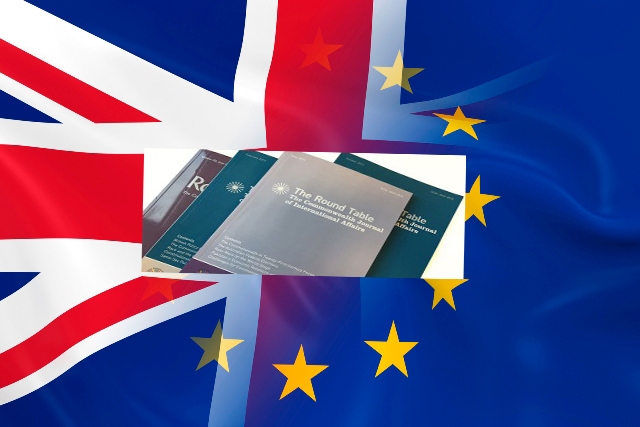 From the Round Table Journal [photo credits: iStock and Taylor and Francis]
From the Round Table Journal [photo credits: iStock and Taylor and Francis]
The Round Table – The Commonwealth Journal of International Affairs has been focusing on the implications of Brexit during the summer.
Here are excerpts and links to the key articles published since the Brexit referendum vote.
From Brexit: ‘Everybody Lost’ By Shridath Ramphal: As I watched in far-off Barbados the BBC’s programme on the counting of the Brexit votes, Jamaica’s 1962 referendum was dominant in my mind—and how a ‘democratic’ process was misused to destroy the destiny of my Caribbean Region. Of course, not everyone will agree with the epithet ‘misused’. But, maybe, scholars will give it some thought now. Norman Manley had half in mind destroying his political enemy Alexander Bustamante when he called the referendum; instead he destroyed himself. Was Cameron justified in putting so much on the line as he did in offering the option to ‘Remain’ or ‘Leave’? Was it really an exercise in ‘democracy’, or a misuse of a democratic process that put at risk the fortunes of millions beyond the process?
One other thought was in my mind that night as I watched with fear that ‘Leave’ might win. It stemmed from my belief that remaining together in any enterprise always requires something more than a weighing of benefits and losses. It requires wanting to be together beyond accounting, acknowledging kinship, oneness, furtherance of values—or elements of them. It requires, in the case of countries that are substantial players in world affairs, an understanding of global interdependence and, as the Washington Post has described it, ‘a liberal vision of an interconnected world’.
I have never forgotten the impact of their absence on me and my sense of irritation when British Prime Minister Margaret Thatcher made it clear beyond doubt in 1990 that, for her, the European project was all, and only, about a ‘market’. I was not naive about Mrs Thatcher; but I had spent many years in the Brandt Commission with Ted Heath and knew and admired the depth of his commitment to Europe as Europe, and the importance of that Europe to the world. I feared that night of the count that there was too little of Ted Heath around—and, alas, that turned out to be true.
The full article is available at the Round Table Journal.
Brexit: The View from Scotland by John M. MacKenzie: The Scots are inevitably troubled that, given their undoubted status as a separate nation, now enjoying well-developed devolution, they should be forced into a departure of which they do not approve and which they consider will be highly damaging to their economy and society. A ‘Yes’ vote in a future independence referendum seems much more likely, and the prospect of a Scotland in the EU and an England and Wales outside seems immensely attractive. It would have all sorts of cultural appeal, but more practically it could entice companies to relocate, possibly producing a ‘Celtic Tiger’ effect. But there are of course major problems. Whether Scotland could remain in the EU as a residual UK (as it were) or as a new entrant is exceptionally problematic. Spain is the principal opponent of such an eventuality, seeking at all costs to avoid separatism in Catalonia and the Basque country. Yet, as any Scot visiting Catalonia knows, the Catalans are eager to make the connection (I have myself been spontaneously kissed by a lady in Tarragona when she discovered I was from Scotland!). Catalans, initially banned from waving their regional flag at football matches, decided to wave the Scottish saltire instead! For similar reasons, the French are also hostile, the Auld Alliance apparently forgotten. Scotland, meanwhile, feels highly sympathetic to other small societies threatened by neighbours (such as Gibraltar).
Brexit is therefore highly likely to increase tensions between Scotland and England.
The full article is available at the Round Table Journal.
Brexit: A View from Gibraltar by Joseph Garcia: In 1973, Gibraltar joined the European Economic Community as it was then, at the same time as the UK. We did so in an arrangement which excluded the Rock from value added tax, from the EU Customs Union and from the Common Agricultural Policy. Gibraltar is the only UK Overseas Territory in the EU.
The arguments put forward in Gibraltar during the referendum campaign were very different from those put across in the UK. The population of Gibraltar has traditionally been far more enthusiastic about the EU than their British counterparts on the UK mainland.
When EU common format number plates for vehicles were introduced, people in Gibraltar paid to change their plates from the traditional ones to the EU ones. Gibraltarians enjoy EU identity cards, which do not exist in the UK, but are valid travel documents throughout the EU. They have access to medical care across the EU on the basis of their EU health cards.
Gibraltar has received some 60 million euros in EU funding for private and public sector projects over the years, mainly under the European Regional Development Fund and the European Social Fund. It enjoys access to the single market of 520 million Europeans which allows the businesses that are based there to sell their services across Europe. Thus, there are plenty of positive reasons why Gibraltar voted so resoundingly to remain in the EU. There are less positive reasons too.
Also available: The full article by David Howell on Brexit, the UK and the Commonwealth: Opportunities and Challenges is available on the Round Table website.



